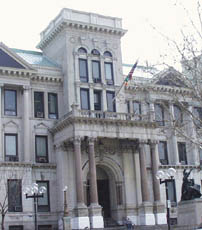At a special meeting called by the Jersey City municipal council last week, the council passed a $314 million spending plan for the 2000 fiscal year, almost nine months after the fiscal year began in July. At Monday’s meeting, the council voted 5-4 in favor of the document that the mayor’s office had turned over to them in December. The end result is that taxes will go up this year for Jersey City residents by roughly 45 cents per $1,000 of assessed property. City Tax Collector Maureen Dolce said that until the county sets the yearly tax rate in June, a more specific number cannot be released. For more than three months, the council has bounced the budget back and forth but has instituted few changes. The Schundler administration is still hoping for $16 million in Distressed Cities Aid from the state. The state legislature is scheduled to consider the matter this week. Present at Monday’s meeting was State Sen. Bernard Kenny (D-Hoboken), who was there to urge the council to pass their budget. “I wanted to impress upon the council the importance of getting the budget passed,” Kenny said later. He said that if the budget was not passed, the governor’s office would have removed Jersey City from the Distressed Cities Aid bill, which is scheduled to go before the State Senate and Assembly. Kenny said he anticipates that the legislation will probably be voted on and passed “by the end of the month.” Voting against the budget last week were Ward A Councilman Robert Cavanaugh, Ward B Councilwoman Mary Donnelly, Ward C Councilman Arnold Bettinger and Ward F Councilwoman Melissa Holloway, all of whom have criticized the spending plan in the past. Kenny said that he would have liked to have seen more of a majority of the council vote in favor of the budget, rather than seeing them so divided on the issue. A staunch critic of the budget and the financial practices of the Schundler administration, Cavanaugh said that taxes would not have gone up if the remainder of a $6 million legal settlement the city won in December were rolled into this budget. Instead, only half of that money is included in the 2000 budget, and the rest is being saved for 2001, which is an election year for the mayor and the council. With the additional $3 million in this year’s budget, Cavanaugh said that there would have been a unanimous vote in passing the spending plan. Cavanaugh said that next year, an election year, he expects taxes to go down because of politics. “The saying goes politicians think for the next election,” Cavanaugh said, “but statesmen think for the next generation.” For months, the council has been torn between passing a budget that included layoffs and/or a tax increase. The thought was that if there were job cuts, taxes would not be increased drastically. Conversely, without any layoffs, taxes would be expected to go up. Many council members went out of their way to go on the record, stating to the public that they would not vote for a budget that raised taxes or put people out of work. “Every year it’s the same nonsense over and over,” Cavanaugh said. “No one wants to take fiscal responsibility for this city.” Cavanaugh also said that the tax increase this year is the result of school and county taxes decreasing, while municipal and city taxes have gone up. On the surface, he said, it looks like the same rates as last year, but when broken down, taxpayers can see that they are paying more municipal taxes this year than last. Next year, the city expects to receive an additional $16 million in state aid. Officials believe that the state has already budgeted $50 million for the distressed cities package. But after researching that, Cavanaugh said that the state is using next year’s allocation to pay for this year’s aid. In short, there may be no aid next year, unless the state plans on borrowing from its 2002 budget. The council inherited the budget at a time when the city appeared to be considering the elimination of a thousand jobs from the municipal payroll. Because of what has been estimated as a $27 million debt, Mayor Bret Schundler said that there was no other place in the budget to save money other than in salaries. Since then, efforts by the local labor unions have helped to avoid massive layoffs, though over 100 city workers received contract buyouts that would eliminate their jobs, but still pay their salary for a short time. In addition, almost 50 other employees were fired by the city after state officials scoffed at the buyouts, and demanded that the mayor cut more in salary than he had bought out. This week, a coalition of local unions was in support of a “yes” vote by the council on the budget. Schundler had originally lobbied the surplus-rich state for $27.4 million in aid, but was offered only $16 million as part of a $54 million Distressed Cities Aid package.
Budget passes: Eight months into fiscal year, council approves $314M spending plan
